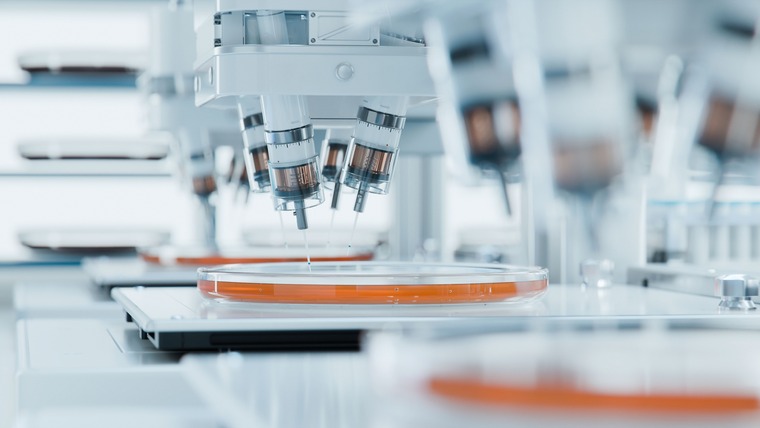
As the Biochemistry Department of Florence Nightingale Hospitals, we do not only produce test results but also provide various services that support clinical decision making, such as diagnosis, development and prevention of disease.
Statistical data show that 70% of medical decisions are made by taking into account laboratory results. Therefore, the Biochemistry laboratory has great importance in the implementation of health services.
With this awareness in our laboratory,
What is Medical Biochemistry?
Medical biochemistry is a branch of science that studies the application of biochemical principles to medical practice. This field involves performing biochemical tests and analyses for the diagnosis, treatment, and prevention of diseases. Medical biochemists develop new treatments by understanding the molecular mechanisms of diseases. In addition, tests performed in medical biochemistry laboratories are critical for monitoring the health of patients and determining appropriate treatment plans.
Keeping our service quality at the highest level has always been our top priority and goal. In order to achieve this goal, participation in international and national quality control programs has been provided regularly since our establishment and the necessary trainings are constantly renewed for all laboratory employees.
Our Group Florence Nightingale Hospitals Biochemistry Department aims to provide the most accurate, reliable and shortest medical laboratory services with the most up-to-date devices, competent personnel and experienced expert staff by closely following the latest technological developments within the framework of today's modern medical understanding.
1. Blood Glucose Test
Blood glucose testing is used to diagnose and manage diabetes by measuring blood sugar levels. There are different types, including fasting blood sugar testing, postprandial blood sugar testing, and HbA1c testing. These tests are important for monitoring whether diabetes is under control and how it is responding to treatment.
2. Lipid Profile
A lipid profile test measures cholesterol and triglyceride levels in the blood. It includes total cholesterol, LDL (low-density lipoprotein) cholesterol, HDL (high-density lipoprotein) cholesterol, and triglycerides. These tests are used to assess your risk of cardiovascular disease and determine appropriate treatment plans.
3. Liver Function Tests
Liver function tests are a series of biochemical tests that evaluate the functionality of the liver. They measure levels of alanine aminotransferase (ALT), aspartate aminotransferase (AST), alkaline phosphatase (ALP), gamma-glutamyl transferase (GGT), and bilirubin. These tests are used to diagnose liver damage, infections, and other liver diseases.
4. Kidney Function Tests
Kidney function tests evaluate kidney health by measuring levels of substances such as creatinine and urea. Serum creatinine testing, glomerular filtration rate (GFR) calculation, and blood urea nitrogen (BUN) testing are important in monitoring kidney function. These tests are used to diagnose kidney disease and monitor treatment.
5. Electrolyte Levels
Electrolyte tests measure levels of electrolytes in the blood, such as sodium, potassium, calcium, magnesium, and chloride. Electrolyte imbalances can lead to a variety of health problems, and these tests are used to monitor and treat fluid-electrolyte balance.
6. Hormone Tests
Hormone tests measure the levels of hormones in the body and are used in the diagnosis of endocrine disorders. Various hormone tests such as thyroid hormones (TSH, T3, T4), cortisol, insulin, sex hormones (estrogen, testosterone) play an important role in the diagnosis of hormonal imbalances and related diseases.
7. Enzyme Tests
Enzyme tests evaluate the functionality of body organs and tissues by measuring the activity of specific enzymes. Levels of enzymes such as creatine kinase (CK), lactate dehydrogenase (LDH), amylase and lipase are used to diagnose muscle damage, pancreatitis and other health problems.
8. Vitamin and Mineral Tests
Vitamin and mineral tests measure levels of essential vitamins and minerals in the body. Tests such as vitamin D, vitamin B12, folic acid, iron and ferritin are used to determine nutritional status and deficiencies.
These biochemical tests are of great importance for early diagnosis of diseases, monitoring response to treatment and evaluating general health status. Tests performed in medical biochemistry laboratories play a vital role in the clinical decision-making process and help to closely monitor the health status of patients.
What Diseases Does the Biochemistry Laboratory Treat?
Biochemistry laboratories play a critical role in the diagnosis and monitoring of many diseases by analyzing biochemical substances found in body fluids. Tests performed in these laboratories are widely used in the diagnosis and management of the following diseases:
1. Diabetes
Biochemistry laboratories play an important role in the diagnosis and management of diabetes. Tests such as blood glucose test and HbA1c test measure blood sugar levels. These tests are essential for the early diagnosis, control and prevention of complications of diabetes.
2. Cardiovascular Diseases
Lipid profile tests (total cholesterol, LDL, HDL and triglyceride levels) are used to assess cardiovascular disease risk. High cholesterol levels can lead to heart diseases such as atherosclerosis and coronary artery disease.
3. Liver Diseases
Liver function tests (ALT, AST, ALP, GGT, and bilirubin levels) evaluate the health of the liver. These tests are used to diagnose hepatitis, fatty liver, cirrhosis, and other liver diseases.
4. Kidney Diseases
Kidney function tests (serum creatinine, GFR, and BUN) evaluate the functionality of the kidneys. These tests are used to diagnose conditions such as kidney failure, glomerulonephritis, kidney stones, and chronic kidney disease.
5. Endocrine Disorders
Hormone tests measure levels of various hormones, including thyroid hormones (TSH, T3, T4), cortisol, insulin, and sex hormones. These tests are used to diagnose endocrine disorders such as hypothyroidism, hyperthyroidism, Addison's disease, Cushing's syndrome, and diabetes.
6. Pancreatic Diseases
Amylase and lipase levels are enzyme tests that evaluate the functionality of the pancreas. These tests are used to diagnose diseases such as pancreatitis and pancreatic cancer.
7. Electrolyte Imbalances
Electrolyte tests measure levels of electrolytes such as sodium, potassium, calcium and magnesium. Electrolyte imbalances are important in diagnosing conditions such as dehydration, kidney disease, heart failure and some endocrine disorders.
8. Anemias and Hematological Disorders
Biochemistry laboratories help diagnose types of anemia by measuring levels of iron, ferritin, vitamin B12, and folic acid. These tests are used to diagnose iron deficiency anemia, megaloblastic anemia, and other hematologic disorders.
9. Metabolic Disorders
Tests used in the diagnosis of metabolic disorders include lactate, ammonia and amino acid analyses. These tests are used in the diagnosis of metabolic acidosis, urea cycle disorders and other hereditary metabolic diseases. Biochemistry laboratories are indispensable for monitoring the health status of patients and making accurate diagnoses. Biochemistry tests help detect diseases at an early stage and create effective treatment plans.
10. Vitamin and Mineral Deficiencies
Vitamin and mineral tests measure levels of nutrients such as vitamin D, vitamin B12, folic acid and iron. These tests are used to diagnose nutritional deficiencies, malabsorption syndromes and related health problems.
Biochemistry laboratories play a vital role in the diagnosis and treatment of diseases. Accurate and timely biochemical tests allow for early detection of diseases and the creation of effective treatment plans. These laboratories provide important information to healthcare professionals in the clinical decision-making process and help monitor the general health status of patients.


